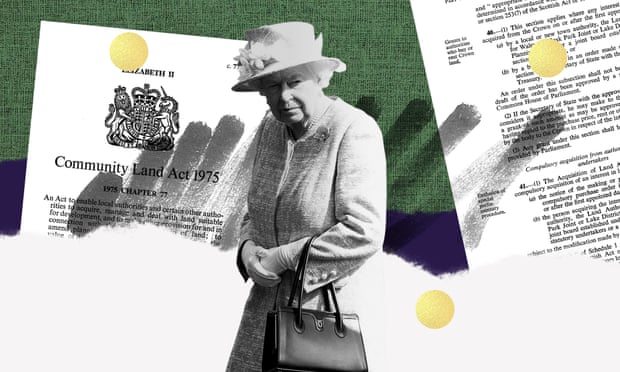
 |
||||
|---|---|---|---|---|
| Volume 52 Number 13, June 4, 2022 | ARCHIVE | HOME | JBCENTRE | SUBSCRIBE |
Workers' Weekly, January 29, 2013 (revised)

More than a 1000 laws vetted by Royal Consent. Photo:
Guardian Design
The archaic character of the Westminster parliamentary system has been further exposed by the publication on January 15 [2013] of a previously confidential Whitehall pamphlet entitled "Queen's or Prince's Consent", publically indicating for the first time the extent to which senior royals are asked to give their consent to legislation. The 23-page document, now available on the Cabinet Office website, details situations where this Royal Consent is required and gives various examples where it has been sought.
Royal Consent is a separate prerogative power to Assent, and is particularly obscure. Assent is the final stage of the legislative process by which a bill passed in the houses of parliament becomes law. By convention, Assent is almost never refused (it was last withheld in 1708).
On the other hand, Consent occurs during the progress of a bill, and does actually get refused. Via this power, the Crown actually vetoes legislation passing through parliament. In addition to full refusal, bills may also be amended as part of seeking Consent.
The publication of the document is the result of a two-and-a-half year legal battle that began when doctoral legal student John Kirkhope made a Freedom of Information request for the pamphlet in August 2011, which was refused by the Cabinet Office on grounds of "legal privilege".
When Information Commissioner Christopher Graham overruled this decision, the Cabinet Office appealed in an information tribunal, which they lost. The pamphlet has now been finally released.
Andrew George MP on January 14 [2013] raised questions surrounding the issue of Royal Consent in parliament. The issue has been reported in the press, but it has so far been kept in the background.
The document specifies that Consent of the Queen, or in certain cases of the Prince of Wales, is required when proposed legislation affects the royal prerogative; hereditary revenues; the Duchies of Lancaster and Cornwall (from which the royal family derives vast incomes [the Queen from the former and Prince Charles from the latter]); or the personal properties or interests of the Crown.
What this actually translates into in reality is a wide range of bills for which Consent is sought. In recent years, for example, Consent was sought for bills which included the Higher Education Act 2004, the Work and Families Bill 2005-6, the Energy Bill 2007-8, the Fixed Term Parliaments Bill 2012-12 and many others.
The Guardian lists some 28 bills subject to Consent from the last ten years alone, a list not claimed to be exhaustive. It is not known how many of these were amended as a result. Cabinet Office minister Chloe Smith has stated a full account of bills affected will not be published, on grounds of cost.
A number of bills have actually been refused Consent. In recent times, these are the reform of the House of Lords Bill 1990, the Palace of Westminster (Removal of Crown Immunity) Bill 1998 and the Military Action Against Iraq (Parliamentary Approval) Bill 1999.
The last of these was a private member's bill introduced by Tam Dalyell MP, which was intended to transfer the monarch's power to authorise military action against Iraq to parliament. As a Bill affecting the royal prerogative, Consent was required. Acting on the advice of the government, the Queen refused to grant Consent for the introduction of the bill. The bill was then dropped and was never debated in parliament.
While it is said this power of veto is only used on the advice of the government, by convention, it nonetheless is another prerogative power wielded by the executive via the arrangement of the monarch-in-parliament. The occasions where Consent has been refused highlight how the monarchy is a tool of the executive for self-serving ends. It demonstrates that the royal prerogative is concentrated in the hands of a few at the heart of the government.